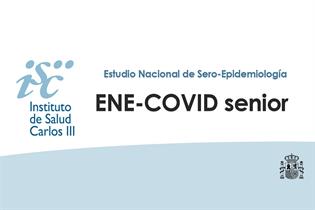First results from the ENE-COVID-senior study show that the third dose boosts immune response in older people
News - 2022.1.19
Cristóbal Belda, director of the Instituto de Salud Carlos III (ISCIII), a Ministry of Science and Innovation agency, has presented the first results of the ENE-COVID-senior study, which analyses long-term immune function after vaccination in the elderly. Early data show that the third dose of the COVID-19 vaccine boosts the immune response to SARS-CoV-2 in older people. Belda announced these results at a press conference held after the Interterritorial Council of the National Health System, in which he participated together with the Minister for Health, Carolina Darias.
During the press conference, Belda explained that the study, which was initially designed to find out how long the immunity induced by the vaccines lasts, has been adapted in recent months to analyse whether the immune response increases after the administration of the third dose and whether the immunity associated with this additional dose is capable of neutralising the new variants. "We have seen that the third dose is effective in raising the number of antibodies and, what's more, these antibodies function against the omicron variant," said Belda.
The ENE-COVID-senior research, carried out by the ISCIII in coordination with the Ministries of Science and Innovation and Health, analyses the efficacy and duration of immunity against SARS-CoV-2 over time, studying the influence of the third dose, the neutralisation capacity against new variants of the virus and the evolution of cellular immunity. The research involves data from 1,200 people aged over 65 years, which will be compared with similar data from 400 people aged under 65 years.
 The results indicate that total antibody levels increase after the third dose of the vaccine, strengthening immunity, and that neutralising antibodies also increase against both the omicron and delta variants. In addition, cell-mediated immunity is maintained after the third dose of vaccine. The study, which is ongoing, has found that protection against the virus is higher in people who have already had COVID-19.
The results indicate that total antibody levels increase after the third dose of the vaccine, strengthening immunity, and that neutralising antibodies also increase against both the omicron and delta variants. In addition, cell-mediated immunity is maintained after the third dose of vaccine. The study, which is ongoing, has found that protection against the virus is higher in people who have already had COVID-19.
In specific figures, regarding antibody levels and their ability to neutralise omicron, the third dose of the vaccine leads to a more than 10-fold increase in neutralising antibody levels against the omicron variant of SARS-CoV-2 in these individuals, an increase that is somewhat greater against the delta variant. In addition, a more than 20-fold increase in overall antibody levels to the receptor binding domain (RBD) of the virus has been demonstrated.
In terms of cell-mediated immunity, a significant increase in interferon gamma (IFNg) and interleukin-2 (IL-2) production has been identified in people who, in addition to receiving the third dose, have had a previous SARS-CoV-2 infection. Taken together, these results place people who have received the third dose within an 'immune safety' zone.
Non official translation




